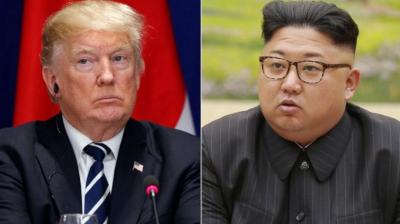Nuclear-armed North Korea wants good relations with the US but could consider a change of approach if Washington maintains its sanctions, leader Kim Jong Un warned in his New Year speech on Tuesday after 12 months of diplomatic rapprochement.
At a summit with US President Donald Trump in Singapore in June, the two signed a vaguely worded pledge on denuclearisation of the Korean peninsula.
But progress has since stalled with Pyongyang and Washington arguing over what that means.
“If the US does not keep its promise made in front of the whole world… and insists on sanctions and pressures on our republic,” Kim said on Tuesday, “we may be left with no choice but to consider a new way to safeguard our sovereignty and interests”.
He was willing to meet Trump again at any time, he added, “to produce a result that will be welcomed by the international community”.
The North is demanding sanctions relief — it is subject to multiple measures over its banned nuclear weapons and ballistic missile programmes – and has condemned US insistence on its nuclear disarmament as “gangster-like”.
Washington is pushing to maintain the measures against the North until its “final, fully verified denuclearisation”.
Kim’s speech “expressed his frustration with the lack of progress in negotiations so far”, said former South Korean vice unification minister Kim Hyung-seok.
The North Korean leader “obviously had certain expectations that the US would take certain steps — however rudimentary they are — after the North blew up a nuclear test site and took other steps. But none of them materialised.
“He is faced with this urgent task to improve his ‘socialist economy’ — which is impossible to achieve without lifting of the sanctions.”
In marked contrast with January 1, 2018, when he ordered mass production of nuclear warheads, Kim said the North had “declared that we would no longer produce, test, use or spread our nuclear arsenal”, calling for the US to take “corresponding measures”.
The production pledge was a “significant evolution in leadership intent, if true”, Ankit Panda of the Federation of American Scientists said on Twitter, but added: “Of course, this is one of those claims where it’ll take more than KJU’s word to be credible.”
Kim spoke sitting in a dark leather armchair, in a large office flanked with packed bookshelves along one side and paintings of his predecessors, his father Kim Jong Il and grandfather Kim Il Sung behind him.
As he began speaking — in a deep, gravelly voice and wearing a dark suit and blue tie — a clock on a desk read at moments after 12.
But at times during the address, it was blurred out and towards the end of the half-hour broadcast, it was close to 1, suggesting the speech was recorded in several takes.
Year of rapprochement
The leader’s New Year speech is a key moment in the North Korean political calendar, reviewing the past and setting out goals for the future.
The 2018 address was a crucial catalyst for the developments that followed.
It came after a year of high tensions when the North made rapid progress with its weapons development, carrying out its sixth nuclear test – by far its most powerful to date – and launching rockets capable of reaching the entire US mainland.
The two leaders traded personal insults – Trump mocked Kim as “Little Rocket Man”, who in turn called him a “mentally deranged US dotard” – and threats of war as fears of conflict rose.
In last year’s speech, Kim warned “the nuclear button is on my office desk all the time”, but also offered to send a team to the forthcoming Winter Olympics in the South.
That opened the way for the South’s dovish President Moon Jae-In to play the role of peace broker.
A rapid sequence of developments followed, with athletes and a senior delegation led by Kim’s powerful sister going to the Pyeongchang Games in February, before Kim met Chinese President Xi Jinping in Beijing ahead of the Singapore summit with Trump.
Kim also met with Moon three times last year — twice at the border truce village of Panmunjom and once in the North’s capital — as Seoul and Pyongyang pursued several reconciliation initiatives, and at the weekend vowed to meet Moon “frequently” this year.
Much of Kim’s speech Tuesday focussed on North Korea’s moribund economy, saying that improving people’s lives was his top priority and tackling energy shortages was an urgent task.
He also said the US and South Korea should no longer carry out joint military exercises — which have been largely halted since the Singapore meeting — calling such drills “a source of tension”.
“War-related equipment — including strategic assets of outside powers — should no longer be allowed to be brought in,” he added.
Seoul and Washington are in a security alliance and the US stations 28,500 troops in the South to protect it against its neighbour, which invaded in 1950.








